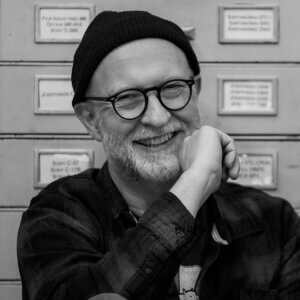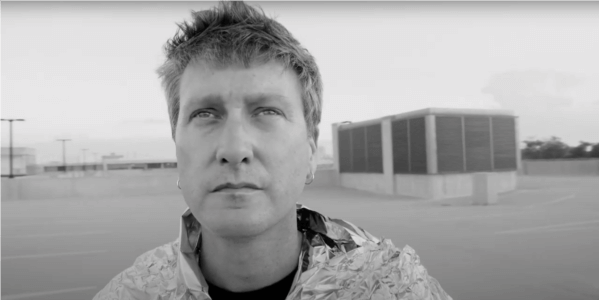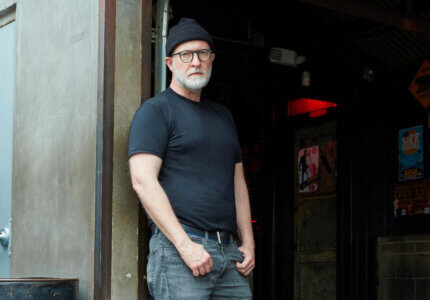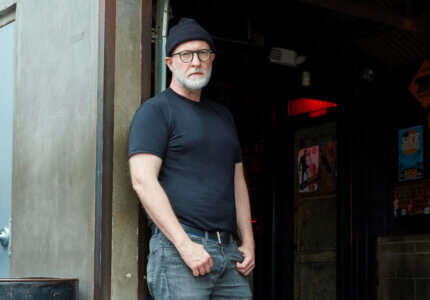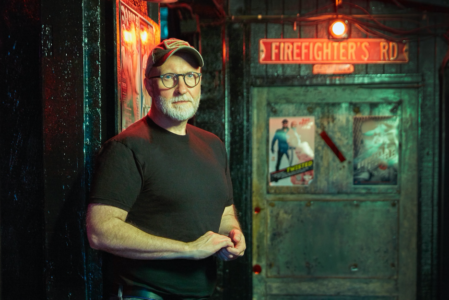Bob Mould Regains His Rage
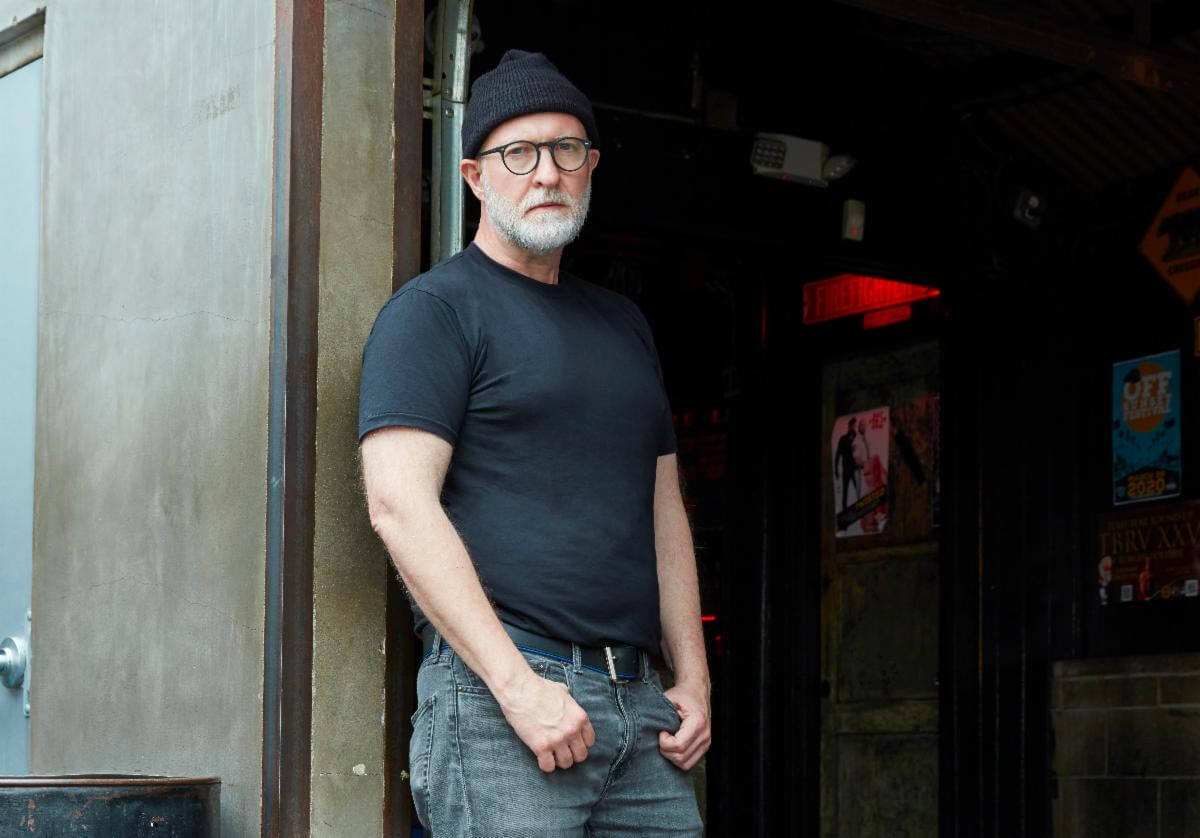
People can change a lot in a year. In 2019, Bob Mould released Sunshine Rock, a delightful collection of songs devoted to the beauty of life, with lyrics like: “My troubles, they are ending/ My sorrows, they are few/ If I write a sunny love song every day/ I can shine so bright on you.” Contrast those words with, “Wake up every day to see a nation in flames/ We click and we tweet and we spread these tales of blame,” from “American Crisis,” the lead single off Bob Mould’s new album Blue Hearts.
People can change a lot in a year. In 2019, Bob Mould released Sunshine Rock, a delightful collection of songs devoted to the beauty of life, with lyrics like: “My troubles, they are ending/ My sorrows, they are few/ If I write a sunny love song every day/ I can shine so bright on you.” Contrast those words with, “Wake up every day to see a nation in flames/ We click and we tweet and we spread these tales of blame,” from “American Crisis,” the lead single off Bob Mould’s new album Blue Hearts.
The Hüsker Dü and Sugar frontman reconnects with his rage on Blue Hearts, with lyrics particularly inspired by Donald Trump’s America. Whether he’s singing about climate change on “Heart on my Sleeve,” or yearning for less frustrating days on “Little Pieces,” Bob Mould has managed to capture the feelings that we’re often too dismayed to express in this chaotic age. Not only does he capture the frustrations of 2020 in his lyrics, but he screams them in a dire anger reminiscent of the yelling on Land Speed Record. Mould notes that every time he uses the word “blue” in an album title the Democrats have won the election that year, and he desperately wants that trend to continue in November. Bob Mould spoke with Stewart Wiseman for a wide-ranging interview discussing the chaos Trump has unleashed, getting introduced to punk shows in Canada, his upcoming career-spanning box set, Ryan Adams, and life under lockdown.
Northern Transmissions: My favourite line on the album is from “Password to My Soul,” where you sing, “We turn to music when our hearts are filled with doubt / I hold out hope this world will right itself somehow / But this constant state of crisis leaves me frail, afraid, and weakened / I try so hard to hold on, falling off the deep end.” I think that might be the best way to sum up the way I’ve felt for the last four years. Did the lyrics to Blue Hearts all spill out in a rage when thinking of the chaos that Trump has unleashed?
Bob Mould: The majority of the record was written in the fall and winter of 2019 and 2020, but the genesis of this album was “American Crisis,” which was actually recorded during the Sunshine Rock sessions. For that one the words all came out in five minutes, there wasn’t a whole lot to think about. When a song like that just appears you have to take it for what it is and not really mess with it. I didn’t spend a terrible amount of time trying to shine these songs up, the first thought was the best thought most of the time. “Password to My Soul” comes at the tail end of the album and was meant to be a summary of all the songs from “Next Generation” until then, followed by “The Ocean,” which is like an epilogue to the album. Those couplets you grabbed are the strongest, I mean that’s really the closing statement of intent with the record. I had this album recorded and finished by March 1st, so I had no way of knowing what was coming with COVID, but I guess my gut was telling me something is up.
Northern Transmissions: Sunshine Rock also came out during the Trump administration, but that album found you in an absolutely euphoric mood when compared to Blue Hearts. Was there a tipping point that happened in between these two releases for why we have Blue Hearts coming out now and not earlier in the Trump presidency?
Bob Mould: I found an apartment in Berlin in the summer of 2016 and spent the better part of four years living there. I obviously knew what was happening in America, but I wasn’t being inundated with it on a minute-by-minute basis as we usually are here. So I had a distance on it, and Berlin has a pretty different way of life than what we have in America. The two albums before, Beauty & Ruin [Merge, 2014] and Patch the Sky [Merge, 2016], were both informed by the loss of my dad and mom. So after two records delving into personal loss, going to Berlin and intentionally writing an upbeat optimistic record was the goal of Sunshine Rock, and I think I got it for the most part. In the summer of 2019 I was playing a lot of solo electric shows in Europe, and by the time I came back to the States in November 2019, it was very clear that “American Crisis” was the song that would be the central theme to Blue Hearts. I feel it’s sort of the job of a songwriter to write what you know, write what you learned, and write what you think might happen.
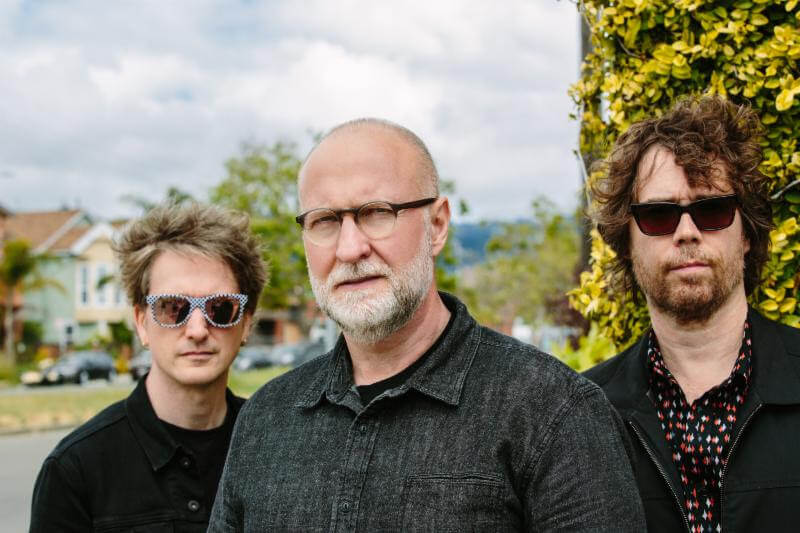
Credit: Alicia J Rose
Northern Transmissions: From living in Berlin, you must have seen the rise of right-wing populism in neighboring countries, and even Germany recently elected many far-right populists to the Bundestag. Are you worried that similar populism might be grabbing a hold of America?
Bob Mould: Yeah, I think specifically of Hungary where Viktor Orbán has built essentially a proto-fascist government, and Poland which has also been that way for the last five years. It’s heartbreaking in Poland, because when Duda’s Law and Justice party was put in power they began an anti-Muslim campaign until they realized that there were very few Muslims living in Poland, and so they switched to targeting the LGBT community. It’s pretty scary just to see how governments can quickly switch scapegoats. If one isn’t working, they’ll go out looking for another one, and that’s what’s been happening in America as well. I’m finding it hard to describe this to people without them saying, “you’re just a globalist or an elitist.” It’s like, no, I’m just a human being and I’ve been to other places, lived next to countries that have gone through this, and I’ve seen it’s really hard to turn back once you go down that fascist populist route.
Once you lose control of commerce, law, and justice, it’s really hard to get it back. I don’t think Americans understand this because we’ve never been confronted with an enemy from within that’s so toxic. George Wallace was close, but nothing like this wholesale vandalism of everything that’s decent and true. I don’t think we’ve seen this before, and I feel it’s sort of my responsibility to say, “hey, wake up! Come on! This is really happening!” If you’ve been listening to my music and trusted yourself with my thoughts for decades, please listen to what I’m saying now. If you believed everything I was saying before, you really have to keep believing what I’m saying, because I don’t think I’m crazy.
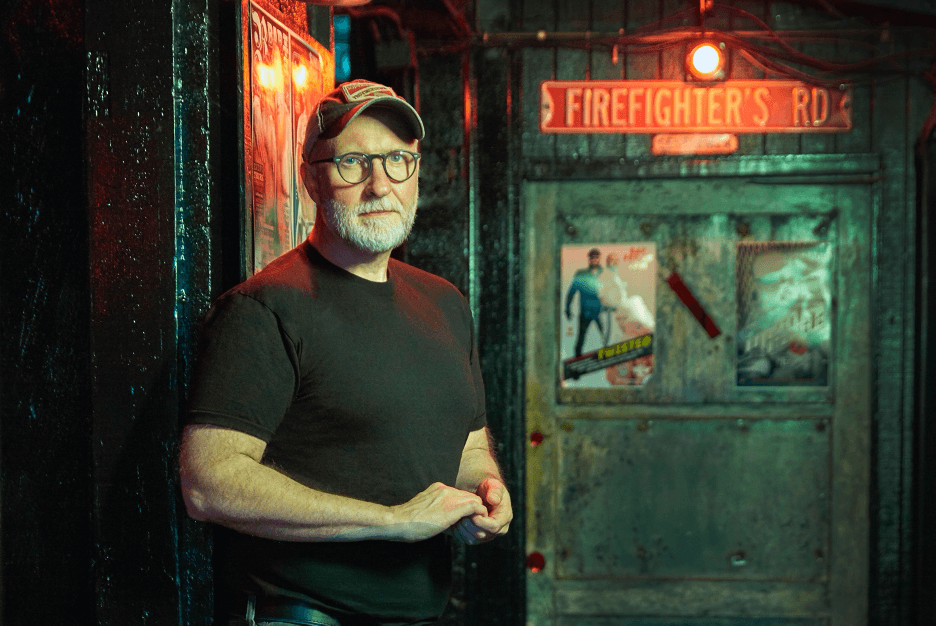
Credit: Blake Little Photography
Northern Transmissions: Back in the 80s with Hüsker Dü, there was a lot of punk rock music made in relation to Reagan. As a kid I discovered punk from the albums that came out in the wake of the George W. Bush presidency and the Iraq War, like American Idiot. Strangely, I don’t think I’ve heard enough punk albums come out in the Trump era. Why do you think we haven’t seen another punk rock revival through this chaos?
Bob Mould: I’ve wondered that myself and I really don’t know. I grew up as a kid believing that music could change the world, and I saw how it changed the world in the late 60s. I was also fortunate enough to be in a band among hundreds of groups that did create a little bit of a different world that people could operate in, alongside bands like D.O.A., Black Flag, Dead Kennedys, and Big Boys. We were all outsiders trying to create a world where we could make some change and build a different way of living. I don’t know, I think maybe there are people in popular music who are worried about losing part of their fanbase by taking a stand. I would suggest to those who are concerned about losing their fanbase that they may lose their own voice. You’re not going to have to worry about your fan base when you’re not allowed to sing what you want. What part of this do people not get?
Northern Transmissions: I wanted to ask you about your thoughts on the Ryan Adams cancellation. He’s a musician who you’ve collaborated with several times, and he apologized for his actions after the New York Times story broke, but we still haven’t heard any new music from him. What do you make of his story, and is there an appropriate path back into the limelight for someone in music who’s been canceled?
Bob Mould: It’s a tough situation for anybody in professional life to be in, whether they’ve been wrongly accused, rightly accused, or all the different shades in between. It’s tough. I think people need to speak truth to their own experiences, and I’ve always felt that any kind of abuse of privilege in a workplace is not a good thing. Ryan and I worked together, and he’s obviously a gifted songwriter. I can’t really speak to his own personal situation, but by and large, I just think that all of us have a responsibility to do the right things with whatever influence we knowingly or unknowingly have over other people. Whether it’s with an audience or a colleague, professional and personal work relations need to be as neutral and fair as they can be.
First Hollywood, then television, then the internet have been how we spread the message of democracy, but inside those professions there’s been a lot of corruption and a lot of abuse. It’s been systemic since the beginning. I think with the advent of social media everyone is held to this different standard. With social media everybody has a voice now and people can share stories to audiences they never could reach before. It’s built to create a frenzy and hashtags, good and bad. The internet is crazy, and much like wildfires, these stories can spread quickly.
Northern Transmissions: You have a career-spanning box set called Distortion coming out in late October, which covers all your recordings from the end of Hüsker Dü until today. Looking back on your career through the box set, I was interested in learning where you were first turned on to punk music. Hüsker Dü is so intrinsically tied to Minneapolis, so I was surprised to learn that you actually grew up in Malone, NY, near my hometown Montreal. I read that your dad drove you an hour and a half to see The Ramones open for Iggy Pop in Montreal. Do you remember those early days, and do you think those long drives to Montreal were foundational in shaping the musician you became?
Bob Mould: My history of going to Montreal for shows starts even before that. I think my first time seeing a show in Montreal would have been Rush opening for Aerosmith at the Montreal Forum when Rush had just put out 2112. I got drunk, then I threw up in the parking lot, then threw up in the Forum, and smoked more pot in the Forum. I barely remember it. I also remember seeing Cheap Trick open for Kiss there, and that was when I realized Cheap Trick were truly an amazing band. But the Ramones opening for Iggy, that took place at a school auditorium [October 8, 1977 at Auditorium le Plateau]. I remember the Ramones came out and it was just insanity for the 35 minutes that they were allotted. I was speechless after seeing that. Iggy was okay, but the Ramones really floored me. I think that was just when Leave Home came out, so I had heard the first album but didn’t know the new stuff yet. That was a pretty important show for me to see, and I think I went up and saw a couple more shows, but my going to punk rock shows really started in 1978 when I moved to the Twin Cities for Macalester College. I was 17 years old, had a fake ID, and the punk scene in Minneapolis was just great. I started seeing shows every weekend. Montreal is a really great city, hopefully when we get the green light to congregate in public again we can get back up there because it’s always a great time.
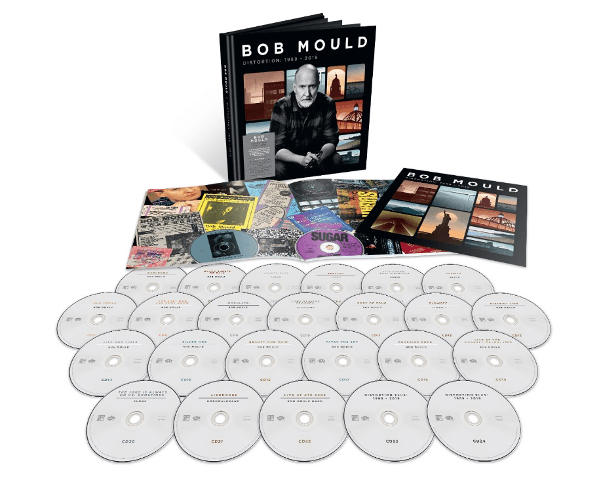
Distortion box set; release date October 23, 2020.
Northern Transmissions: The Distortion box set is absolutely massive, largely because for your entire career you’ve been on a steady pace of releasing one album every two years. Hüsker Dü famously recorded at a frenetic pace as well, with six albums in four years at one point, including double records. Do you ever have writers block? What do you think has made you so prolific over the years?
Bob Mould: I sort of have a methodology that over the years has gotten increasingly stronger. I write and I write and I write, and then one day something important will appear, like an honest truth. An “I can write about this forever” type of idea, and that becomes almost like a center tent pole to build a big tent around. At that point, I have to think about how do I get stakes in the ground around the tent pole, and what kind of fabric is this tent? How big is it and how colorful is it? Does it need to be resistant to the wind, or rain, or insects? I guess the key is establishing a central idea that I have to nail down around the edges, and then I just start filling the tent with more ideas. That’s typically how a writing cycle goes for me, and once I have a writing cycle completed, then it’s time to make a record.
What I did differently this time though was I went out and tried these songs in front of an audience right before recording them, and that specific part of the methodology is what I think makes Blue Hearts a really unique record. I would say the last time I did that in 1991 before the first Sugar album, and that’s also how Hüsker Dü always worked. We would tour material before we recorded it, and I think that’s a great way to get a sense of how new songs fit next to your previous work. The box set starts with records developed like that, and then moves on to records that were recorded right after the writing process. The methods are really important, and I think that’s what gives Blue Hearts its urgency. It’s a pretty cool contrast.
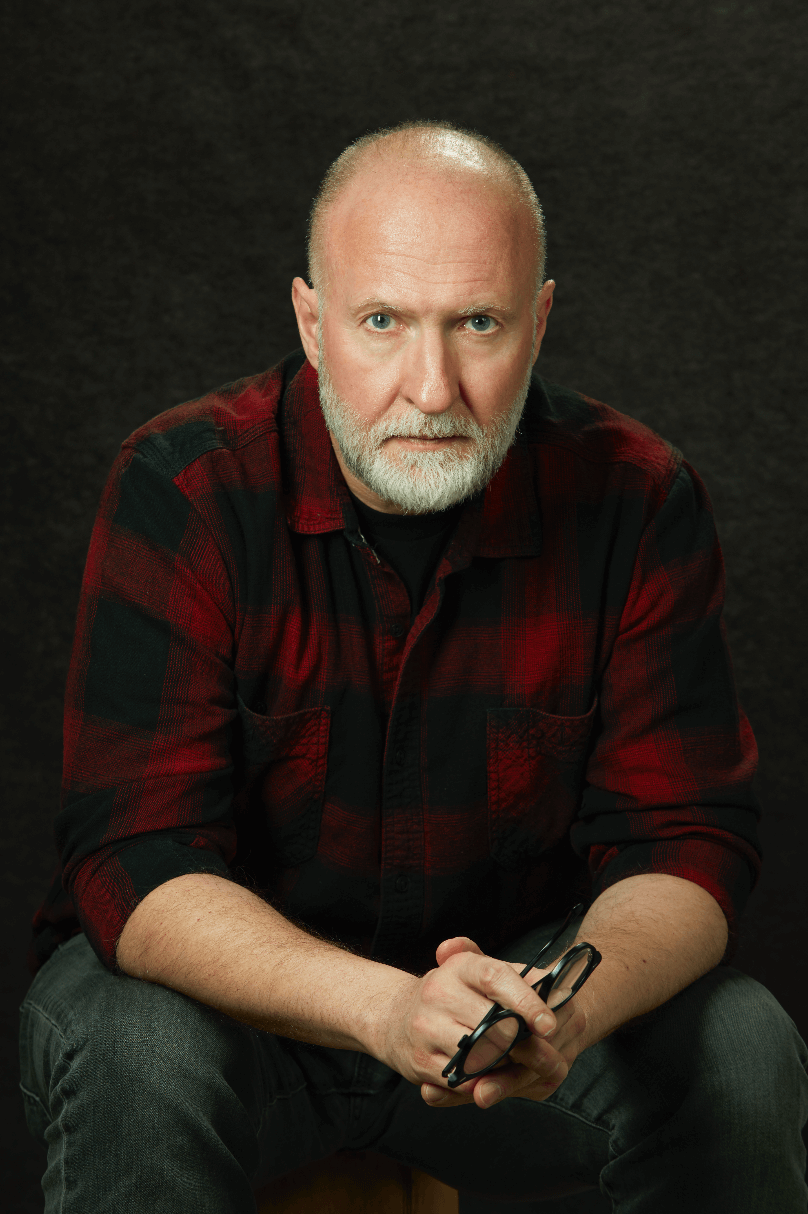
Credit: Blake Little Photograph
Northern Transmissions: Is there an album in the Distortion box set that you feel didn’t get enough attention at the time of its release that you hope fans rediscover this time?
Bob Mould: I think the albums from the entire 2000s, the electronic period. In 1998, after The Last Dog and Pony Show, I stepped away from rock and really wanted to be in New York City and work on my gay identity. I never felt that I had connected thoroughly with the gay community, and it was nice to spend a number of years doing that, getting welcomed, and being able to contribute and use my energy there. The soundtrack to that period of my life was made up of clubs and electronic music, so I set about teaching myself how to make that sort of music. I recognized at the time that wasn’t what my rock audience was expecting, and they didn’t give it as much of a chance as I had hoped. Maybe now with time and distance people will be able to better appreciate those albums. The landscape of popular music is a lot broader now, and I think people’s ability to listen to music in different ways without as many biases is greater, so I think those records might have a better chance this time. Maybe people will see them in a better light now. It doesn’t change what they were for me, but maybe times have changed and they may sound different to people now; so that would be a nice hope for me. I think the Sugar era and the 2010s records were very bright, but that less illuminated decade where I was doing a lot of DJing and remixing was really important to me too. Maybe those will be the ones that shine this time.
Northern Transmissions: How are you coping with not being able to play any shows right now? What do you think will be the future of live music and shows?
Bob Mould: I think eventually we will return to congregating in rooms where we can all sing at the top of our lungs together, but not right now. I think in the meantime there have been a lot of people who’ve been creative, whether it’s something as simple as playing live into a laptop, to streaming entire shows that are pre-recorded, to socially distanced outdoor shows in a drive-in movie setting or a field with distanced circles. Unfortunately none of these new ideas have grabbed my fancy yet, so I’m at a bit of a loss for what to do. I only know one way to do what I do best, and with a record like Blue Hearts, it’s to scream at the top of my lungs in a crowded room. That’s not socially safe right now, so I have to wait my turn. I’m looking into maybe streaming a solo-electric show, I think people would like that. I’ve been speaking to different people and gathering data on their experiences of doing online shows like that, so I think something will come to me at some point. It’s just a shame because Blue Hearts was built for the stage, and I think the listener can hear that across the album.
Interview by Stewart Wiseman
Latest Reviews
Tracks
Advertisement
Looking for something new to listen to?
Sign up to our all-new newsletter for top-notch reviews, news, videos and playlists.





